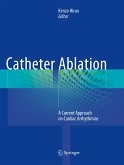This book presents the latest findings on early repolarization syndrome (ERS). Readers will find essential information on ERS with regard to its etiology, epidemiology, clinical diagnosis and manifestation, genetic background, and risk stratification, as well as the relationship between ERS and Brugada syndrome. Further chapters discuss pharmacological and non-pharmacological therapies.
Early repolarization (ER) pattern or J wave in the inferior and /or lateral leads was initially considered to be a benign electrocardiographic pattern and is often found in healthy young individuals. However, it was reported that ER or J wave was more frequently recognized in patients with idiopathic ventricular fibrillation (IVF) than in control subjects, and that there is a higher incidence of recurrent VF in case subjects with ER or J wave than in those without. This is the early repolarization syndrome or ERS, the theme of this contributed volume. ERS is diagnosed in patients with ER pattern or J wave in the inferior and /or lateral leads of the standard 12-lead electrocardiogram (ECG), who have been resuscitated from IVF.
ERS is a relatively a new clinical entity in the field. This much-awaited contributed volume is one of the first references available in the market, an ideal resource for all cardiologists and electrophysiologists working on ERS and related topics.
Early repolarization (ER) pattern or J wave in the inferior and /or lateral leads was initially considered to be a benign electrocardiographic pattern and is often found in healthy young individuals. However, it was reported that ER or J wave was more frequently recognized in patients with idiopathic ventricular fibrillation (IVF) than in control subjects, and that there is a higher incidence of recurrent VF in case subjects with ER or J wave than in those without. This is the early repolarization syndrome or ERS, the theme of this contributed volume. ERS is diagnosed in patients with ER pattern or J wave in the inferior and /or lateral leads of the standard 12-lead electrocardiogram (ECG), who have been resuscitated from IVF.
ERS is a relatively a new clinical entity in the field. This much-awaited contributed volume is one of the first references available in the market, an ideal resource for all cardiologists and electrophysiologists working on ERS and related topics.








